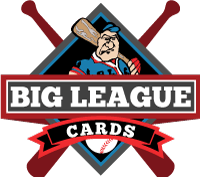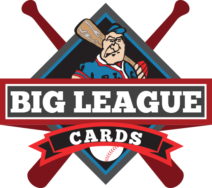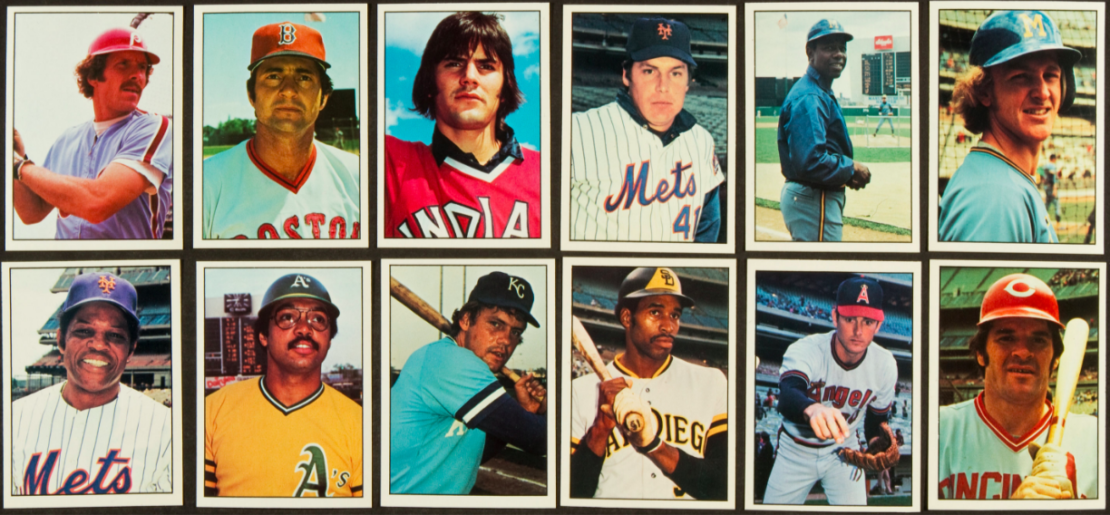Inside the Pack: Unlicensed SSPC Set Makes for Tough Autographs
Last week, a friend and I went to a card show in The Villages, Florida. The Villages contains a large retirement community, and often there are former ballplayers who sign autographs for free because they live there. This show was no exception: Bob Stinson, a former catcher in the 70s and 80s, sign up to sign in the back of the room.
My friend brought two cards with him – one of which, a 1978 Topps, he graciously gave to me to get signed. The other was a 1975 (or 1976, depending on who you ask) SSPC card. The SSPC set is arguably one of the most attractive sets of the late 70s and early 80s. Modeled after the 1953 Bowman set, it contains only a player photo on the front, and biographies on the back that were written and edited by a young, pre-ESPN-and-MSNBC college student named Keith Olbermann. The SSPC set contained photos taken in the New York stadiums, so subjects who were not on the Yankees and Mets are generally in their road uniforms.
As we approached Mr. Stinson, we exchanged pleasantries and I slid the 1978 Topps card across the table. “This is the most popular one,” he said. After I thanked him, my friend passed the SSPC card to him. The former major leaguer pushed it back across the table. “Got a thousand bucks?” he asked. We laughed.
He did not. “I’ll only sign that card for a thousand bucks.” We looked at each other, than at him. It was easy to tell that he was being serious. My friend asked him why. “It’s a bootleg card, and I won’t sign them,” he explained. “They came in 1975 and took all our pictures, but I had a contract with Topps Chewing Gum and never signed a contract with them. We never saw a dime from these cards.” Stinson also told us he signed a few and sells them for $1,000 each, something I didn’t believe until I looked and ebay and found that, sure enough, he had one listed at $1,000, and accepted a $900 offer for it.
He’s not wrong. SSPC was actually one of the sets that laid the groundwork for Fleer’s successful challenge of Topps’s baseball card monopoly in 1980. Mike Aronstein, who also produced the TCMA minor league and vintage reprint cards of the 70s and 80s, wanted to sell a large, full set of cards. Aronstein did not obtain any licenses, and the set’s production and advertising in Aronstein’s magazine, Collector’s Quarterly, drew the ire of Topps, which sued SSPC. In a settlement similar to the one Topps would reach with Upper Deck in early 2010, SSPC was allowed to sell its back stock of cards, but was disallowed from producing any further cards.
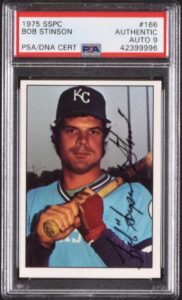
Throughout the years there have been players who refuse to sign a particular card for some reason. Bo Jackson won’t sign his iconic black and white 1990 Score card due to a dispute by the photographer. Ricky Wright won’t sign his 1987 Topps card, and Kelly Gruber won’t sign his 1990 Leaf card, but no one knows why. (Rumor is they want to sign a stack and leave it behind for their families to sell after they pass away.) Certainly, not getting compensated is a very valid reason to not sign a card.
In researching, I found that many years ago, Keith Olbermann had a complete signed set of the SSPC cards, with one exception: Bob Stinson. I also discovered that a few years later, Robert Edward Auctions offered up a signed copy for $1,000, and noted the following in their description: “Finally, in 2015, Stinson relented and agreed to sign five cards as part of a special private signing. Our consignor, as an SSPC enthusiast and autographed set collector, was involved in this signing and was thrilled to be able to add Stinson to his set and the sets of collectors with whom he worked to make this a reality. The offered example represents his duplicate, which he is making available in hopes that it helps another collector finally check Stinson off his wantlist.” I have no doubt that collector was Olbermann.
Interestingly, I also discovered that a few other players won’t sign their SSPC cards, though they have signed some in the past. Another collector showed his response from Bob Montgomery after sending his SSPC card through the mail:
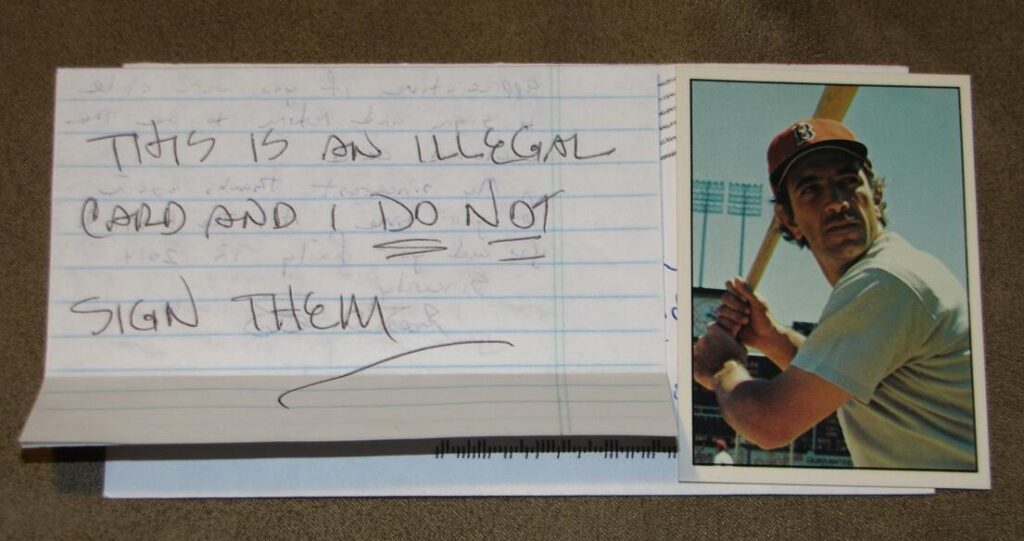
Who knows – maybe Stinson has a stack of signed SSPC cards as an insurance policy for his family. Or maybe he really has just stuck to his morals for 45 years. In either case, it was a truly fascinating experience, and an interesting lesson to learn first hand.
